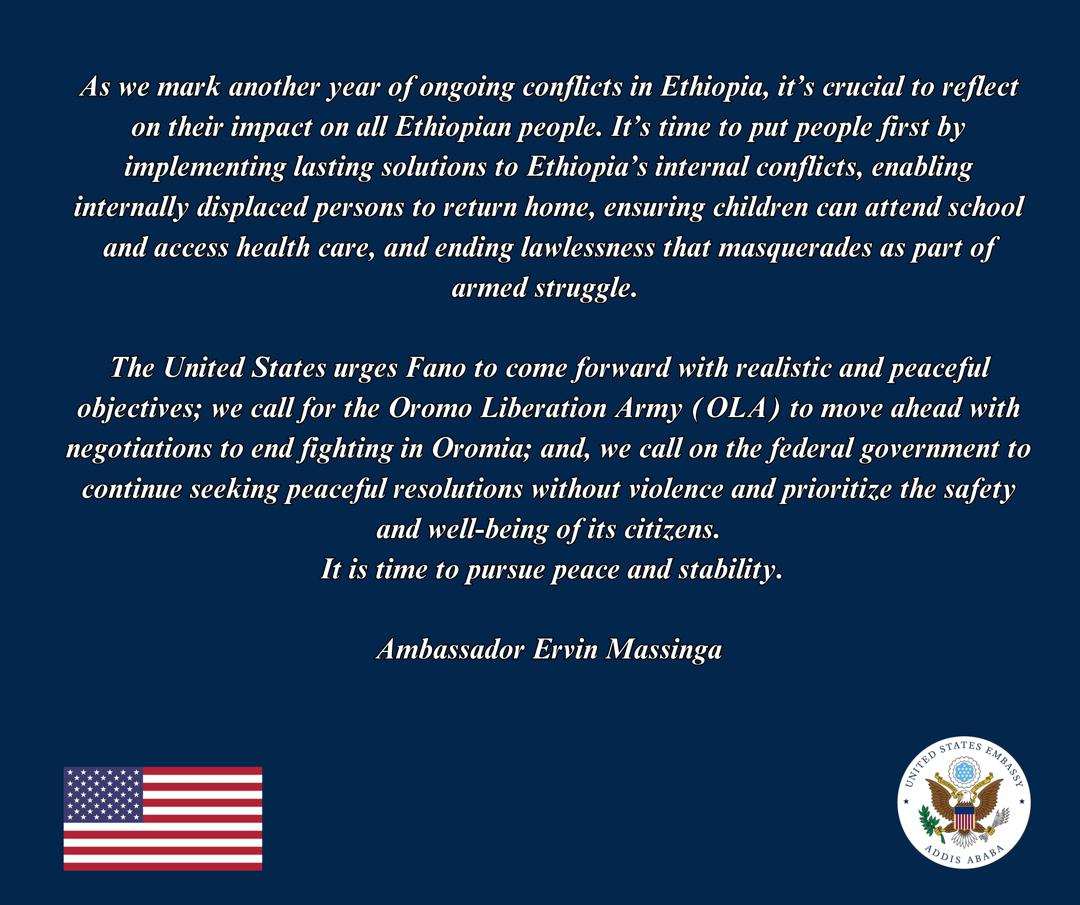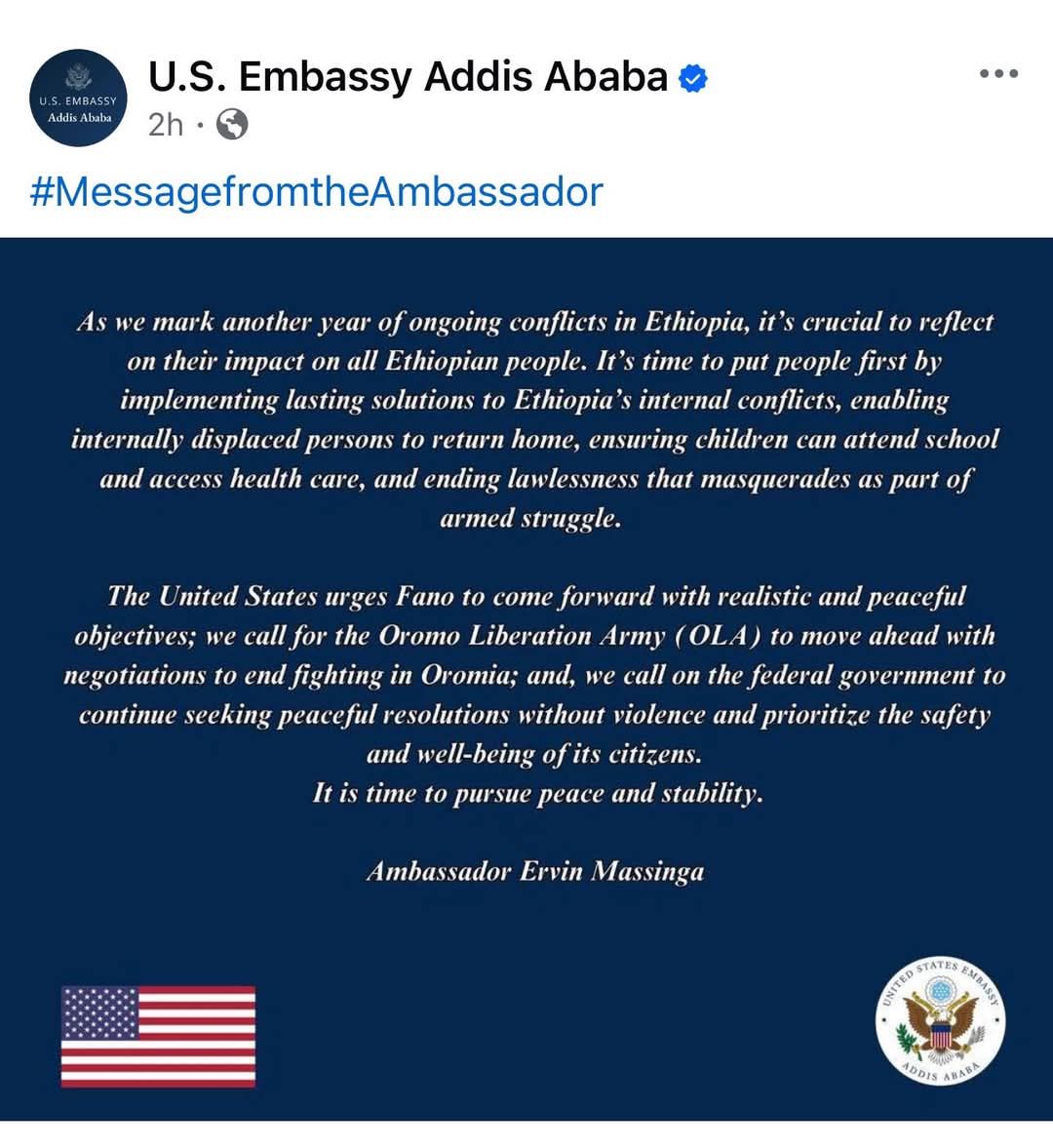The statement by U.S. Ambassador Ervin Massinga, issued during a critical period of internal strife in Ethiopia, carries significant domestic and international political weight. By calling for a peaceful resolution, negotiation, and the cessation of military operations—including drone strikes—against civilians, the United States has positioned itself as both a critic of ongoing government actions and a potential mediator in Ethiopia’s political crisis. This statement reflects a shift toward prioritising human rights, peace-building, and inclusive political dialogue in Ethiopia’s complex and fragile landscape.
1. Legitimizing Armed Political Groups as Negotiation Partners
One of the statement's most striking implications is the recognition of the Oromo Liberation Army (OLA) as a legitimate actor in the peace process. Historically labelled as a terrorist organisation by the Ethiopian government, the OLA’s inclusion in the ambassador’s call for negotiations challenges the government's narrative and pressures it to engage diplomatically rather than militarily. This may embolden the OLA and its supporters while opening space for a broader political solution in Oromia.
2. Pressure on the Ethiopian Federal Government
Ambassador Massinga’s direct criticism of the federal government’s use of drone strikes signals growing international concern over human rights violations. It reflects a broader shift in U.S. foreign policy prioritising civilian protection and conflict de-escalation. The U.S. urges the Ethiopian government to alter its counterinsurgency strategy and pursue a political solution by calling for an end to such military tactics. This could place the federal administration under pressure from both internal opposition and international donors and allies.
3. A Call for Inclusivity and Civilian-Centered Governance
The ambassador’s statement emphasises the need to “put people first,” referring to the internally displaced, children, and access to essential services. This focus on humanitarian concerns implicitly critiques the government’s priorities and calls for a reorientation of governance toward inclusivity, public service delivery, and civil rights. Such a message may strengthen civil society voices advocating for democratic reform and accountability in Ethiopia.
4. Implications for Regional Stability and Foreign Relations
The mention of Fano, an Amhara militia group, underscores the ethnic complexity of Ethiopia’s conflicts. By calling on Fano to adopt peaceful objectives, the U.S. acknowledges the multi-front nature of the crisis while pushing all parties toward dialogue. This could help de-escalate ethnic tensions and signal to regional governments that the U.S. supports a unified but federal Ethiopia responsive to its diverse populations.
Moreover, this diplomatic posture may recalibrate Ethiopia-U.S. relations. The Ethiopian government may view the statement as interference or support for insurgent groups, potentially straining ties. However, it also presents an opportunity for Ethiopia to regain international trust by committing to inclusive peace talks and reforms.
5. Encouraging a New Political Culture
Finally, the ambassador’s message calls for a political culture rooted in negotiation, realism, and peace. It promotes the idea that sustainable governance in Ethiopia must move away from zero-sum politics and militarised conflict toward pluralism and accountability. This could strengthen institutions like the National Dialogue Commission and inclusive transitional justice mechanisms if embraced.
Conclusion
Ambassador Massinga’s statement is a diplomatic gesture and a powerful signal that Ethiopia’s internal conflicts require urgent and inclusive political solutions. By advocating for peace, dialogue, and protection of civilians, the U.S. lays the groundwork for potential mediation efforts and a broader realignment of Ethiopian politics. Its implications are profound: they challenge the current militarised approaches, recognise the legitimacy of marginalised voices, and call for a politics centred on the well-being of all Ethiopians.
U.S. Embassy Addis Ababa


No comments:
Post a Comment